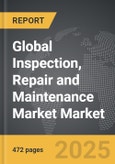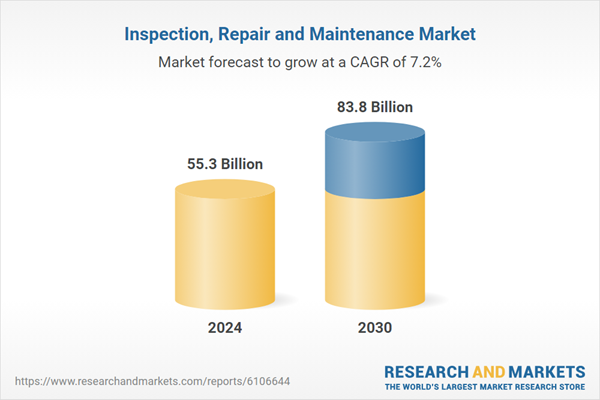Global Inspection, Repair and Maintenance Market - Key Trends & Drivers Summarized
Why Is Inspection, Repair and Maintenance Becoming Central to Asset Management Across Industries?
Inspection, repair and maintenance activities are becoming increasingly critical as industrial assets age and infrastructure systems face mounting pressure to perform reliably under intensifying operational, environmental and regulatory conditions. From oil rigs and pipelines to bridges, aircraft, manufacturing equipment and power plants, the continued safe and efficient operation of critical infrastructure depends heavily on structured inspection, proactive maintenance and timely repair. Many of these assets were designed decades ago, and while initial construction standards may have been high, ongoing degradation due to wear, corrosion, fatigue and environmental exposure requires frequent assessment. As downtime for heavy equipment or public infrastructure can lead to massive financial losses and safety risks, organizations across sectors are prioritizing robust IRM strategies. Industries such as energy, transportation, water, defense, and construction are making the shift from reactive maintenance to predictive and preventive models in order to extend asset lifespans, reduce lifecycle costs, and ensure compliance with increasingly stringent safety and environmental standards. With growing global demand for reliability and uninterrupted services, inspection and maintenance are no longer viewed as operational costs but as strategic investments. This change in perspective is driving widespread adoption of integrated IRM programs that bring together structural analysis, sensor-based diagnostics, and planned interventions, elevating the importance of this sector in both public and private operations. As industrial economies look to modernize their infrastructure and preserve capital-intensive assets, inspection, repair and maintenance activities are moving to the center of long-term asset management and operational strategy.Can Technology Revolutionize Efficiency and Accuracy in Inspection, Repair and Maintenance?
Rapid technological advancement is transforming the landscape of inspection, repair and maintenance by enabling faster, safer and more accurate assessments while reducing downtime and labor costs. Innovations such as drones, robotics, and remote-operated vehicles are allowing technicians to inspect hard-to-reach or hazardous environments without placing personnel at risk. High-resolution imaging, infrared thermography, ultrasonic testing and 3D laser scanning are now standard tools in many industries, providing detailed condition assessments that support precise maintenance decisions. Artificial intelligence and machine learning algorithms are being applied to analyze inspection data, detect anomalies, and predict potential points of failure before they escalate into costly breakdowns. Predictive maintenance models driven by real-time data from IoT-connected sensors are replacing traditional schedules based on estimated wear, allowing organizations to intervene only when truly necessary. Digital twins are being used to simulate structural conditions and stress behaviors, improving the planning of repair activities and optimizing maintenance timing. Augmented reality is helping field technicians visualize internal systems, overlay digital schematics, and access remote expert support in real time. Cloud-based platforms enable centralized data storage and analytics, allowing asset managers to monitor multiple sites and assets simultaneously. Robotics are not only inspecting but now performing minor repairs autonomously, such as applying protective coatings or cleaning critical components. These technological advancements are not just improving the accuracy of diagnostics, they are also reducing inspection times, minimizing service interruptions, and lowering overall maintenance costs. As a result, technology is reshaping the IRM sector into a data-driven, proactive and highly optimized function that supports smarter asset management and safer operations.How Do Sector-Specific Needs Shape IRM Strategies and System Design?
The approach to inspection, repair and maintenance varies significantly across industries, shaped by the specific operational risks, regulatory standards and lifecycle requirements of different sectors. In the oil and gas industry, for instance, offshore platforms and subsea pipelines must be inspected regularly to detect corrosion, stress fractures or leaks that could result in environmental disasters. These conditions require specialized underwater inspection robots, pressure-tolerant sensors and remote-control systems that operate in deep-sea environments. In aviation, aircraft are subjected to stringent regulatory frameworks that mandate frequent inspections of structural components, avionics, and engines, often within tight operational windows to avoid grounding. This sector prioritizes lightweight diagnostic equipment, standardized reporting protocols and high-speed maintenance tools. In the transportation and civil infrastructure sector, aging bridges, tunnels, and rail networks require continuous monitoring using drones, strain gauges and corrosion sensors to prevent structural failures. For manufacturing plants, the focus is often on keeping production lines running smoothly, so IRM strategies emphasize preventive maintenance of motors, conveyors and automation systems. The energy sector, particularly wind and solar farms, relies on IRM to maintain high uptime, involving inspections of turbines, blade conditions, and electrical systems through a combination of drone imaging and ground-level diagnostics. Nuclear facilities require highly specialized inspection systems that comply with strict safety and radiation protocols, often involving robotic systems operated from a distance. Each of these industries demands unique tools, frequencies and reporting standards, which has led to the development of highly customized IRM systems tailored to specific use cases. As asset diversity continues to grow, IRM providers are increasingly offering modular and sector-specific solutions that align with the regulatory, technical and operational realities of each industry.What Factors Are Fueling the Rapid Growth of the Global IRM Market?
The growth in the inspection, repair and maintenance market is driven by a convergence of factors rooted in infrastructure aging, safety regulation, technological innovation and global industrial expansion. One of the primary drivers is the aging nature of critical infrastructure around the world, particularly in North America and Europe, where many bridges, pipelines, power plants and industrial facilities were built over 40 years ago and are now approaching or exceeding their design lifespans. The increasing risk of catastrophic failures and economic losses has prompted both governments and private owners to invest heavily in monitoring and maintenance. Regulatory pressures are also intensifying, with updated safety codes and environmental mandates requiring regular and documented inspections across industries ranging from energy to construction and aviation. Simultaneously, the rapid industrial growth in Asia-Pacific, the Middle East and parts of Africa is creating demand for comprehensive IRM services to support newly built infrastructure and manufacturing facilities. The widespread adoption of new technologies including drones, AI, robotics and predictive maintenance tools is lowering the cost and increasing the scalability of IRM services, making them more accessible to a wider range of industries and asset owners. The shift toward sustainability and asset longevity is also encouraging companies to focus on preventive and condition-based maintenance rather than costly replacements. Moreover, the trend toward smart cities, smart grids and digital industrial ecosystems is generating demand for integrated IRM solutions that align with data-driven infrastructure management strategies. As organizations seek to minimize unplanned downtime, reduce operational risk and extend the lifespan of valuable assets, the role of IRM continues to grow in both strategic importance and market size. These drivers collectively indicate a strong trajectory for the global IRM market, with long-term growth supported by both technological advancement and economic necessity.Report Scope
The report analyzes the Inspection, Repair and Maintenance market, presented in terms of market value (US$). The analysis covers the key segments and geographic regions outlined below:- Segments: Service Type (Inspection Service, Repair Service, Maintenance Service); Technology (Remote Inspection Technology, Predictive Maintenance Technology, Augmented Reality & Virtual Reality Technology); Delivery Model (In-House Delivery Model, Outsourced Delivery Model, Hybrid Delivery Model); End-Use (Oil & Gas End-Use, Power Generation End-Use, Infrastructure End-Use, Manufacturing End-Use, Aerospace & Defense End-Use, Other End-Uses).
- Geographic Regions/Countries: World; United States; Canada; Japan; China; Europe (France; Germany; Italy; United Kingdom; Spain; Russia; and Rest of Europe); Asia-Pacific (Australia; India; South Korea; and Rest of Asia-Pacific); Latin America (Argentina; Brazil; Mexico; and Rest of Latin America); Middle East (Iran; Israel; Saudi Arabia; United Arab Emirates; and Rest of Middle East); and Africa.
Key Insights:
- Market Growth: Understand the significant growth trajectory of the Inspection Service segment, which is expected to reach US$52.9 Billion by 2030 with a CAGR of a 8.6%. The Repair Service segment is also set to grow at 4.7% CAGR over the analysis period.
- Regional Analysis: Gain insights into the U.S. market, valued at $15.1 Billion in 2024, and China, forecasted to grow at an impressive 11.5% CAGR to reach $17.8 Billion by 2030. Discover growth trends in other key regions, including Japan, Canada, Germany, and the Asia-Pacific.
Why You Should Buy This Report:
- Detailed Market Analysis: Access a thorough analysis of the Global Inspection, Repair and Maintenance Market, covering all major geographic regions and market segments.
- Competitive Insights: Get an overview of the competitive landscape, including the market presence of major players across different geographies.
- Future Trends and Drivers: Understand the key trends and drivers shaping the future of the Global Inspection, Repair and Maintenance Market.
- Actionable Insights: Benefit from actionable insights that can help you identify new revenue opportunities and make strategic business decisions.
Key Questions Answered:
- How is the Global Inspection, Repair and Maintenance Market expected to evolve by 2030?
- What are the main drivers and restraints affecting the market?
- Which market segments will grow the most over the forecast period?
- How will market shares for different regions and segments change by 2030?
- Who are the leading players in the market, and what are their prospects?
Report Features:
- Comprehensive Market Data: Independent analysis of annual sales and market forecasts in US$ Million from 2024 to 2030.
- In-Depth Regional Analysis: Detailed insights into key markets, including the U.S., China, Japan, Canada, Europe, Asia-Pacific, Latin America, Middle East, and Africa.
- Company Profiles: Coverage of players such as Agronutris, Aspire Food Group, Beta Hatch, BioflyTech, Bühler Group and more.
- Complimentary Updates: Receive free report updates for one year to keep you informed of the latest market developments.
Some of the 34 companies featured in this Inspection, Repair and Maintenance market report include:
- Aker Solutions
- Boskalis Westminster
- DeepOcean
- DNV
- DOF Subsea
- EM&I Group
- Fugro
- Helix Energy Solutions Group
- James Fisher and Sons plc
- MISTRAS Group
- Oceaneering International
- Petrofac
- Proserv
- ROSEN Group
- Saipem
- SBM Offshore
- Stork (a Fluor company)
- Subsea 7
- TechnipFMC
- Wood plc
This edition integrates the latest global trade and economic shifts into comprehensive market analysis. Key updates include:
- Tariff and Trade Impact: Insights into global tariff negotiations across 180+ countries, with analysis of supply chain turbulence, sourcing disruptions, and geographic realignment. Special focus on 2025 as a pivotal year for trade tensions, including updated perspectives on the Trump-era tariffs.
- Adjusted Forecasts and Analytics: Revised global and regional market forecasts through 2030, incorporating tariff effects, economic uncertainty, and structural changes in globalization. Includes historical analysis from 2015 to 2023.
- Strategic Market Dynamics: Evaluation of revised market prospects, regional outlooks, and key economic indicators such as population and urbanization trends.
- Innovation & Technology Trends: Latest developments in product and process innovation, emerging technologies, and key industry drivers shaping the competitive landscape.
- Competitive Intelligence: Updated global market share estimates for 2025, competitive positioning of major players (Strong/Active/Niche/Trivial), and refined focus on leading global brands and core players.
- Expert Insight & Commentary: Strategic analysis from economists, trade experts, and domain specialists to contextualize market shifts and identify emerging opportunities.
Table of Contents
Companies Mentioned (Partial List)
A selection of companies mentioned in this report includes, but is not limited to:
- Aker Solutions
- Boskalis Westminster
- DeepOcean
- DNV
- DOF Subsea
- EM&I Group
- Fugro
- Helix Energy Solutions Group
- James Fisher and Sons plc
- MISTRAS Group
- Oceaneering International
- Petrofac
- Proserv
- ROSEN Group
- Saipem
- SBM Offshore
- Stork (a Fluor company)
- Subsea 7
- TechnipFMC
- Wood plc
Table Information
| Report Attribute | Details |
|---|---|
| No. of Pages | 472 |
| Published | February 2026 |
| Forecast Period | 2024 - 2030 |
| Estimated Market Value ( USD | $ 55.3 Billion |
| Forecasted Market Value ( USD | $ 83.8 Billion |
| Compound Annual Growth Rate | 7.2% |
| Regions Covered | Global |









